Table of Contents
When individuals envision the optimal weather conditions for the efficient operation of solar panels, they typically visualize a day with abundant sunlight and higher temperatures. Although solar panels indeed generate substantial energy on hot, sunny days in midsummer, it is important to note that their functionality is not limited to this specific period.
A widespread misbelief is that solar panels exhibit minimal effectiveness during winter. While it is accurate that the energy output of solar panels reaches its highest point in direct sunlight and under UV rays, it is crucial to clarify that winter temperatures do not significantly impede the overall performance of solar panels.
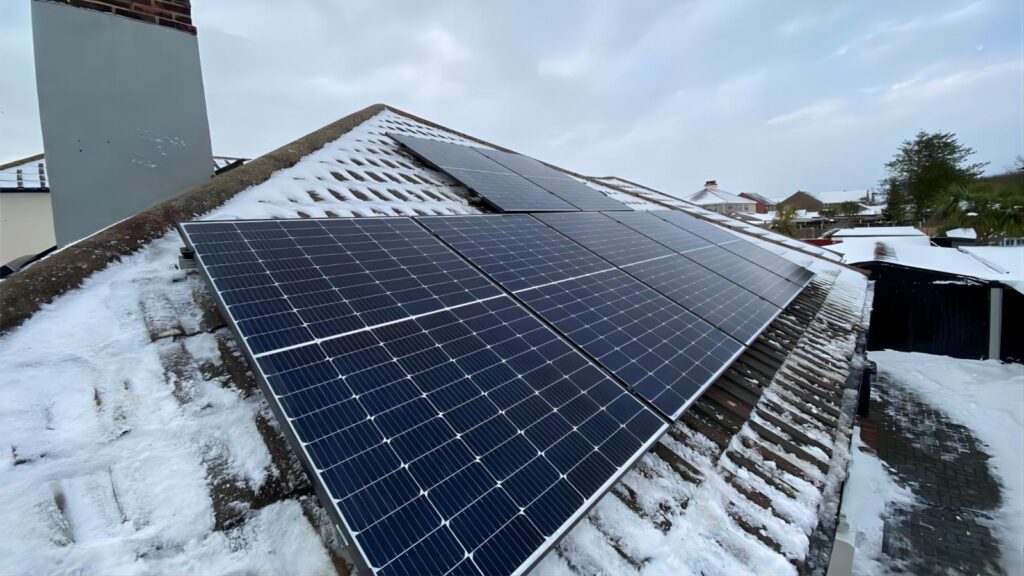
Why do solar panels still produce electricity in the winter?
It’s important to first understand how solar panels work. Solar panels are made from silicon wafers, a semiconductor material in which electrons are excited in response to photons of light to produce electricity.
It’s crucial to note that solar panels are responsive to all forms of light, not just direct sunlight. They can also harness diffuse light, which results from the scattering of light by particles like rain clouds in the atmosphere. This capacity enables solar panels to function effectively during winter, even in the absence of direct sunlight.
Surprisingly, rainy weather can be advantageous for solar panels. Rain acts as a natural cleanser, washing away accumulated dirt and grime from surfaces. This cleansing effect is particularly beneficial as it prevents the obstruction of light, potentially enhancing the efficiency of solar panels.
Contrary to common belief, cold weather actually benefits the energy production of solar panels. Solar panels, being electronic devices akin to computers and radios, operate more efficiently in cooler temperatures than in hotter conditions. This characteristic contributes to their sustained performance and efficiency, especially in colder climates.
Does winter affect the power generated by solar panels?
While the cold weather itself does not have a detrimental impact on the functionality of solar panels, other factors, such as snowfall, can influence the overall energy production. Living in an area with regular winter snowfall does not render solar panels ineffective; in fact, they are widely adopted in many cold climates. The ultimate impact hinges on the amount of snow accumulating on the solar panels.
Minor snow accumulation typically does not disrupt solar panel performance significantly, as the sun’s UV rays can penetrate a small layer of snow until wind or other factors dislodge it. Although solar panels are designed to withstand the weight of substantial snowfalls, excessive accumulation can lead to a reduction in production levels. The angled construction of solar panels aids in optimizing the absorption of the sun’s UV rays and facilitates the sliding off or easy removal of most accumulated snow.
In cold areas, choose solar panels with high snow load capacity and take care to clean them regularly.The TwiSun X PV modules are made of the new upgraded 6065-T6 aluminum alloy frame: the cavity is widened and thickened, and two new reinforcement bars are added, which can better protect the PV cells. The frontal snow load is either equal to or greater than 6000 Pa, with a simultaneous increase in mechanical load by 20%. So this solar panel is more suitable for cold and snowy areas.
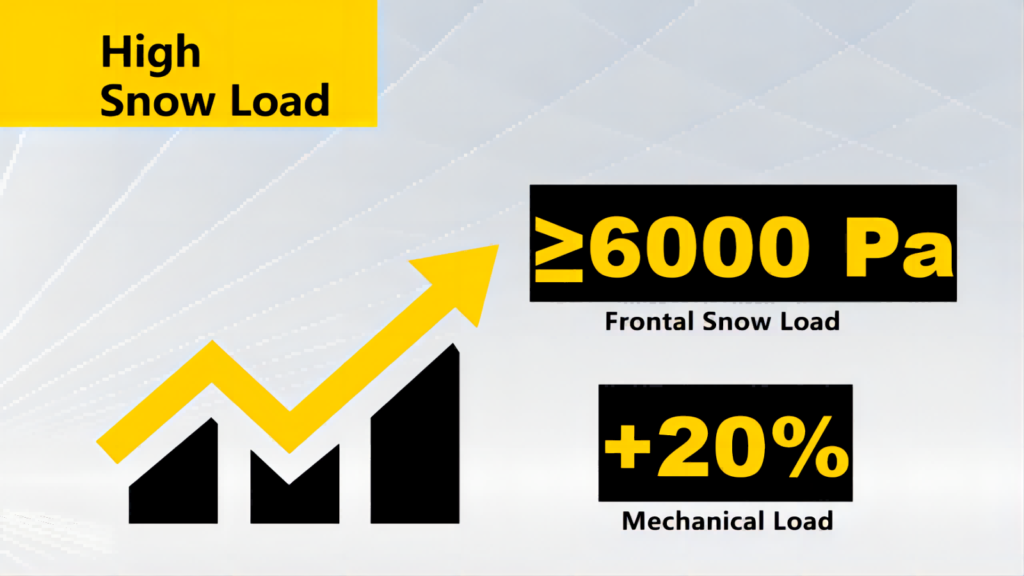
How much electricity do solar panels generate in the winter?
Typically, solar panel output experiences a decline in winter compared to summer, primarily due to shorter days and a higher likelihood of cloud cover obstructing sunlight. On average, a 5kW system is expected to generate 13kWh per day during winter, contrasting with the 20kWh per day it generates during the summer.
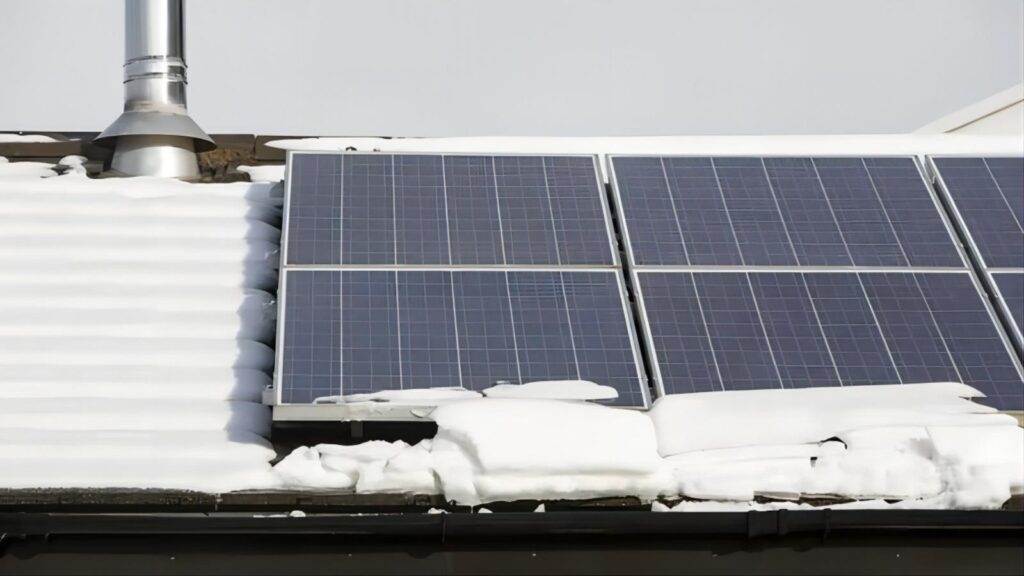
The duration of sunlight available on a given day is considerably shorter in winter than in summer. Although this reduces the time solar panels can operate at peak efficiency, the available sunlight in most regions remains sufficient to justify their use. Cloudy days also contribute to decreased efficiency, as solar panels are not exposed to direct sunlight.
Therefore, you need to choose a solar panel that performs well in low-light conditions on rainy and cloudy days.
IBC solar panel, the technology is distinguished by its superior low-light performance, making it an ideal choice for winter conditions with limited daylight. Maysun’s IBC solar modules further excel with minimal compound central loss, surpassing PERC products in low light scenarios. Notably, at an irradiance level of 200W/m², IBC modules demonstrate a remarkable 2.01% relative performance improvement. Additionally, their high open-circuit voltage characteristics facilitate a swift attainment of the inverter’s operating voltage in the early morning and evening, effectively extending the duration of power generation.
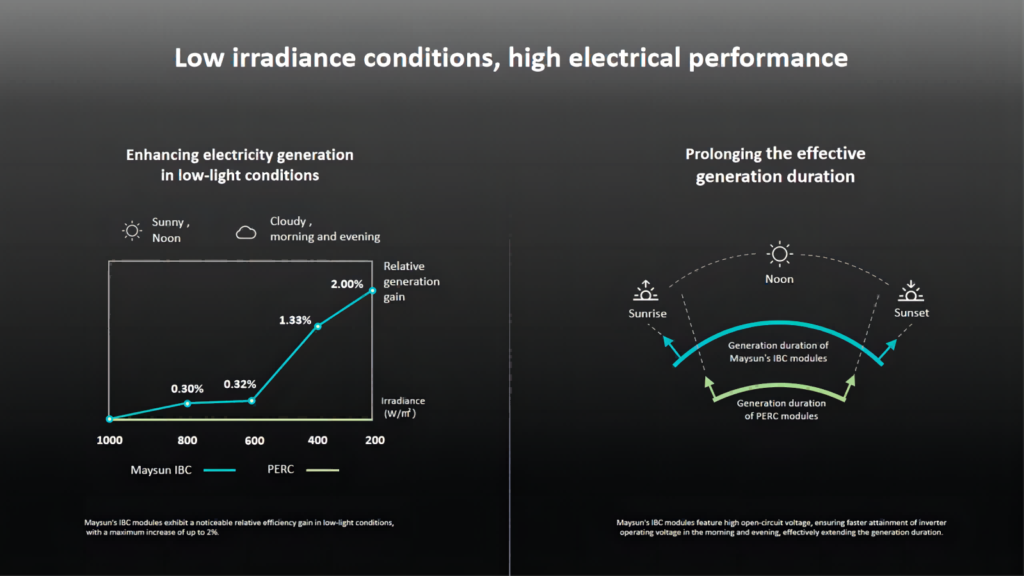
In addition, IBCs are characterized by a low temperature coefficient. The low temperature coefficient of only -0.29/°C reduces the impact of temperature variations on power generation performance and improves the yield of the entire power generation cycle. As a result, IBC solar panels are less affected by cold winter conditions.
Moreover, the power generation efficiency of IBC is also very good. IBC solar panel has no metal grill line shading on the front side, which reduces the light loss, and the light receiving area is larger, increasing by about 2.5%, which significantly improves the power generation efficiency.
How to avoid winter snow on solar panels?
1. Choose Tilted Solar Panel Installation for Effective Snow Management: Improve snow removal efficiency by opting for solar panels installed at an optimal angle, allowing snow to naturally slide off and minimizing any obstruction. The recommended placement angle for photovoltaic panels is 45 degrees, facing due south. Utilize the following formula to calculate the azimuth for PV panel mounting angle:
Azimuth = (peak moment of load in a day (24-hour system) – 12) x 15 + (longitude – 116)
2. Consistent Snow Clearance: In favorable weather conditions, regularly remove snow from your solar panels. Utilize tools such as a long-handled broom or specialized solar panel cleanup tools for a gentle snow removal process, ensuring the panel surface remains undamaged.
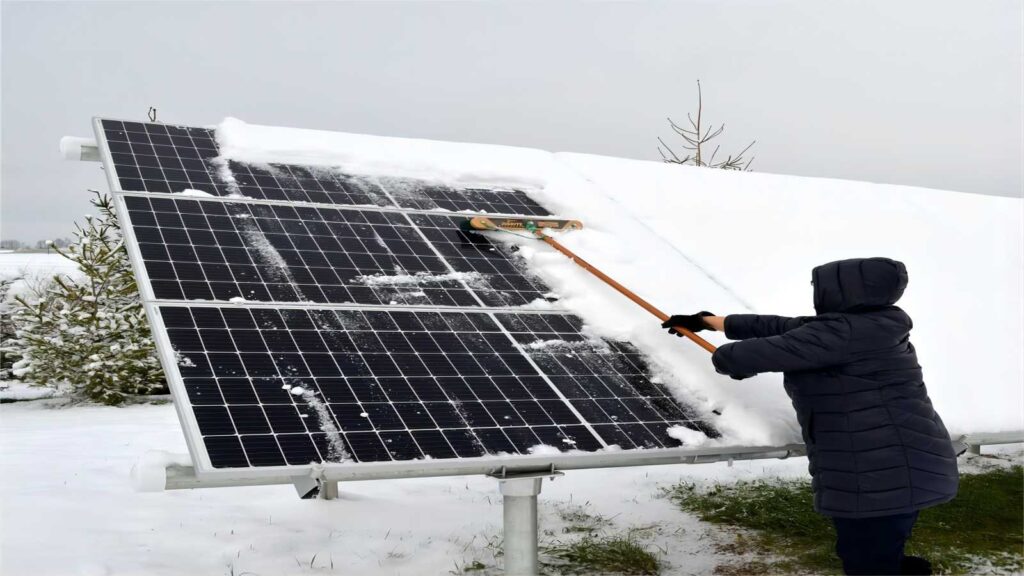
3.Optimize Maintenance with Well-Chosen Locations: Select solar panel installation sites that facilitate easy cleaning, streamlining the cleanup process for maximum convenience when needed.
Maysun’s solar panel product range includes various specifications and sizes to meet the needs of different customers. Whether for home installations or industrial applications, Maysun provides highly customized solutions to ensure customers can maximize the use of solar resources and achieve significant savings in energy consumption.
Reference:
Mike (2021) Are solar panels efficient in winter?
Calculator, S. (2021) Do solar panels work in winter.
Effectiveness of Solar Panels During the Winter Months – Renewable Energy Magazine, at the heart of clean energy journalism (2020) – Effectiveness of Solar Panels During the Winter Months – Renewable Energy Magazine, at the heart of clean energy journalism.
Boiler Guide Limited (no date) Will solar panels still work in the winter? | Solar Guide.
Whitlock, R. (2022) Do solar panels work in winter? The answer is more complex than you think.
Admin (2023) Do solar panels work in the winter?
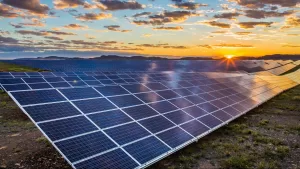
New Photovoltaic news you should know about (March 2024)
Table of Contents REC Unveils a 430 W Heterojunction Solar Module Boasting 22.2% EfficiencyREC, a Singapore-based PV module manufacturer, introduces its residential solar modules featuring Alpha heterojunction cell technology. Production has commenced at REC’s Industry 4.0 fab in Singapore, with initial shipments scheduled
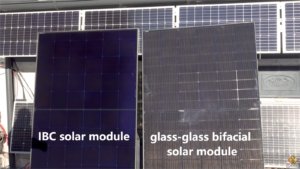
IBC Solar Modules vs. Bifacial Glass-Glass Solar Modules: Which Is More Suitable for Winter or Low-Light Conditions?
Table of Contents Introduction As the demand for renewable energy continues to surge, advancements in solar technology have broadened the spectrum of component choices available to us. Among these, IBC (Interdigitated Back Contact) full black solar modules have garnered special attention due to
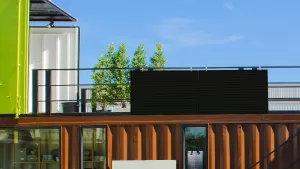
Why Are Lightweight Bifacial Solar Panels the Best Choice for Balcony Solar Power Plants?
Table of Contents In the quest for efficient and eco-friendly home energy solutions, solar photovoltaic technology has emerged as a key player due to its sustainability and clean energy benefits. Particularly in the space-constrained urban settings, the effective conversion of every inch of
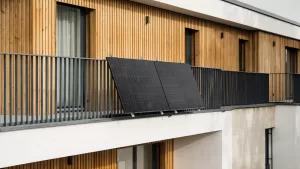
Questions You Might Ask About Balcony Solar Power Plants in 2024
Table of Contents What is a Balcony Solar Power Plant? Similar to a traditional photovoltaic panel, a Balcony Solar Power Plant is a device designed to generate electricity from solar energy. This green energy generator is specifically tailored for self-consumption, but it comes with
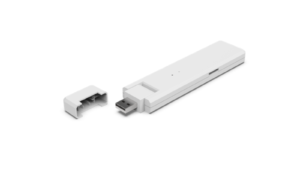
A Step-by-Step DTU Guide for Balcony Solar Power Plants
As renewable energy becomes increasingly integral in our daily lives, Maysun Solar’s Balcony Solar Power Station, with its advanced technology and user-friendly design, represents a transformative approach to home solar solutions. The integration of a Data Transfer Unit (DTU) enhances its smart functionality
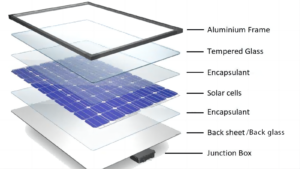
What Are The Main Components of Solar Panels?
What are the main components of solar panel? Solar panels, the cornerstone of solar energy technology, are composed of several integral parts, each contributing to their ability to harness sunlight and convert it into electrical energy. In this article, we will explore the essential


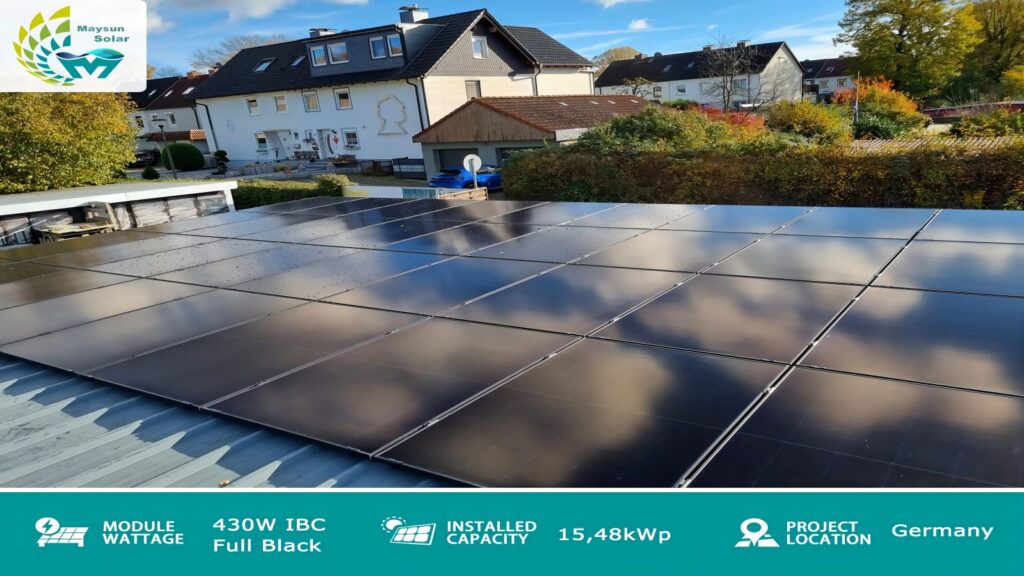
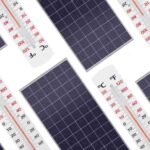
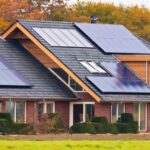
I’ve read some good stuff here. Certainly worth bookmarking for revisiting. I wonder how much effort you put to make such a excellent informative website.
Thank you for your appreciation!